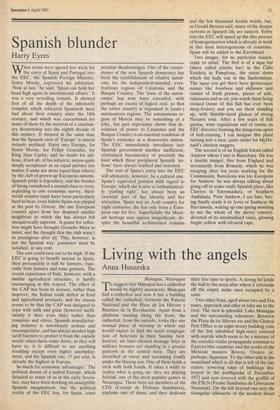Spanish blunder
Harry Eyres
When terms were agreed last week for the entry of Spain and Portugal into the EEC, the Spanish Foreign Minister, Senor Moran, expressed his jubilation: `Now at last,' he said, 'Spain can hold her head high again in international affairs.' It was a very revealing remark. It showed first of all the depth of the inferiority complex which educated Spaniards have had about their country since the 18th century, and which was exacerbated for many of them by the survival of a reaction- ary dictatorship into the eighth decade of this century. It showed at the same time that the Spanish view of 'Europe' is almost entirely mythical. Entry into Europe, for Senor Moran, for Felipe Gonzalez, for King Juan Carlos, and no doubt for mil- lions, if not all, of his subjects, means quite simply acceptance as an equal partner (no matter if some are more equal than others) by the club of grown-up European nations. Spanish pride is legendary, and the burden of being considered a second-class or even, according to one economic survey, third- world country must have been particularly hard to bear, even before Spain was pipped at the post by Greece, the one European country apart from her despised smaller neighbour to which she has always felt unequivocally superior. A pause for reflec- tion might have brought Groucho Marx to mind, and the thought that the club wasn't so prestigious after all. This, however, is not the Spanish way: pundonor must be satisfied, at any 'cost .
The cost could turn out to be high. If the EEC is going to benefit anyone in Spain, then presumably it will be farmers, espe- cially fruit farmers and wine growers. The recent experience of Italy, however, with a similar agricultural structure, is hardly encouraging in this respect. The effect of the CAP has been to worsen, rather than improve, the Italian trade deficit in food and agricultural products, and the reason seems to be that the CAP was designed to cope with milk and grain (however ineffi- ciently it does even that) rather than tomatoes and olives. Spanish manufactur- ing industry is notoriously archaic and 'uncompetitive, and has always needed high tariff barriers to protect it from the outside world: when these come down, as they will have to, it is difficult to see anything resulting except even higher unemploy- ment, and the Spanish rate, 17 per cent, is already the highest in Europe.
So much for economic 'advantages'. The political dream of a united Europe, which deluded so many of us in the early Seven- ties, may have been working on susceptible Spanish imaginations, but the political reality of the EEC has, for Spain, some peculiar disadvantages. One of the corner- stones of the new Spanish democracy has been the establishment of relative auton- omy for the independent-minded, ever- fractious regions of Catalonia and the Basque Country. The 'state of the auton- omies' has now been extended, with perhaps an excess of logical zeal, so that the entire country is organised in (semi-) autonomous regions. The autonomous re- gion of Murcia may be something of a joke, but past experience shows that de- volution of power to Catalonia and the Basque Country is an essential condition of Spain's existence as a democratic nation. The EEC immediately introduces into Spanish government another inefficient, centralised bureaucracy of precisely the kind which these peripheral Spanish 'na- tions' have always loathed and resented.
The cost of Spain's entry into the EEC will ultimately, however, be a cultural one. Spain's equivocal position with regard to Europe, which she is now so enthusiastical- ly 'putting right', has, always been an essential part of her identity and her attraction. Spain was an Arab country for eight centuries; she has only been a Euro- pean one for five. Superficially the Moor- ish heritage may appear insignificant, de- spite the beautiful architectural remains
and the few thousand Arabic words, but, as Gerald Brenan said, many of the deeper currents in Spanish life are eastern. Entry into the EEC will speed up the dire process of homogenisation which is already at work in this most heterogeneous of countries. Spain will be added to the Euroblend.
Two images, for no particular reason, come to mind. The first is of a tapa bar (there called pincho bar) in the Calle Estafeta in Pamplona, the street down which the bulls run in the Sanfermines. The tapas you get there have picturesque' names like bombeos and elerantos and consist of fresh prawns, pieces of sole, calamares and so on; you watch them being cooked (none of this fish has ever been deep-frozen) and you eat them standing up, with thimble-Sized glasses of strong Navarre rosé. After a few years of fish quotas, wine regulations and of course an EEC directive banning the dangerous sport of bull-running, I can imagine this place turning into a nice, quiet outlet for McDo- nald's chicken nuggets.
The second is of an English friend called Andrew whom I met in Barcelona. He was a double emigre, first from England and secondarily from Brussels, which he was escaping after ten years working for the Commission. Barcelona was too European for Andrew: he was always talking about going off to some really Spanish place, like Caceres in Estremadura, or Southern Andalusia. Poor Andrew, I see him, hav- ing finally made it to Jerez or SanItIcar de Barrameda, waking up one spring morning to see the whole of the sherry country, divested of its unsubsidised vines, glowing bright yellow with oil-seed rape.










































 Previous page
Previous page